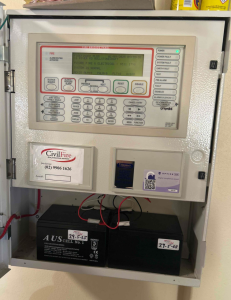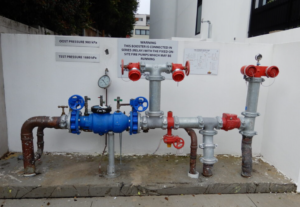
Fire Panel Batteries & AS1851 Requirements
If you’ve recently had your fire panel serviced and noticed a non critical defect or non-conformance relating to the batteries, you’re not alone.

Wireless Interlink Modules and Bases in Smoke Alarms
What Are Wireless Modules and Bases? Modern smoke alarms in multi-level homes or properties with multiple smoke alarms (inside sole occupancy units or

Lithium Ion Batteries & Fire Compliance
While there are currently no requirements under the National Construction Code (NCC) for the storage or charging of lithium-ion batteries, fire risks associated

Deferred Implementation of AS1851 (Feb 2026)
NSW has deferred mandatory compliance with AS 1851 until 13 February 2026, but fire safety obligations remain. Learn what this means for building owners, how to stay compliant, and why early action is key to protecting your property and occupants.

Vegetation Management – Hydrants
Ensure fire safety in your strata building by maintaining vegetation clearances & visibility around hydrant boosters and valves. Learn about essential standards, real-life examples, and tips for keeping hydrants accessible and vegetation managed. Prioritize safety with expert advice from Civil Fire.

5-Yearly Servicing of Hydrant & Sprinkler Systems
With the legislation of AS1851 in NSW coming into force in 2025, the 5-yearly service of the fire hydrant system and sprinkler system
10 year old smoke alarms
Civil Fire have recently updated our policy to defect smoke alarms when they are over 10 years old. Previously, this was a recommendation item only.
The reason for this change is the legislation of the Australian Standard for the Maintenance of Fire Protection – AS1851. This standard was legislated in NSW on 16/12/22, and all buildings must be maintained in accordance with this standard by 13th February 2025.
The Environmental Planning and Assessment (Development Certification and Fire Safety) Regulation 2021 was amended to in December 2022 to read as follows:

AS1851 is a controlled document so it can’t be shared here, but under table 6.4.2.3, the standard advises that the smoke alarms must be replaced when the service life is exceeded. The service life is written in the manufacturer’s specifications (the little piece of paper that comes in the box with a new smoke alarm). Most manufacturers’ specifications state that the alarm should be replaced every 10 years.
What does this mean for Annual Fire Safety Statements…
After 13th February 2025, building owners MUST replace all smoke alarms that are over 10 years old in order to receive their AFSS (this includes smoke alarms inside units and in the common area). We have started to defect smoke alarms as of this year that are over 10 years old to help the building disperse costs in the lead up to this cut off date.
More information for building owners can be found here:

I don’t think we’ve had contractors come through before who were so clean and tidy, helpful and responsive with ideas about how to better maintain the heritage and be compliant and generally respectful of the property.

He was so thoughtful, he stopped the really noisy part of the repair so I could answer calls. I went out at lunch, and he was on his hands and knees washing the floor in the entry because he’d brought in some debris from the street.

People are very quick to complain but slow to compliment so I just wanted to say thank you for your prompt service.



